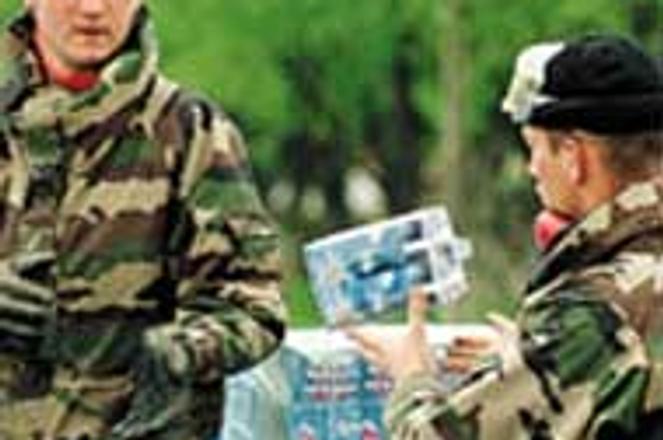Slovak troops will be used for peaceful purposes only, says Defence Minister Pavol Kanis.Foto: TASR
Up to 40 Slovak military engineers will be deployed to Albania to join the 8,000-member Allied Harbour mission, which will be engaged in peacemaking operations in Albanian regions that have been affected by the conflict in neighbouring Kosovo. Slovak officials said the planned mission had earned the country high praise from both NATO and the European Union, and would not be the last of its kind.
According to Defence Minister Pavol Kanis, the Slovak mission was a demonstration of support for the current NATO bombing campaign in Yugoslavia. "The consequences of the Kosovo tragedy and the high number of resulting refugees is a catastrophe," Kanis told The Slovak Spectator on May 26. "The situation must be solved internationally. The NATO initiative is founded upon humanitarian ideals, and Slovakia would like to take part in this humanitarian mission."
The engineers, currently training in Nitra, are expected to assist Belgian, British and Dutch troops in repairs to damaged infrastructure, in road maintenance and erections of tents, in providing humanitarian aid and health care for Kosovo refugees and in de-mining activities.
While agreeing that sending engineers to Albania intensified Slovakia's involvement in the Kosovo conflict, Defence Ministry officials drew the line at sending Slovak troops to fight alongside NATO troops were a ground war to be launched. However, Kanis did not rule out Slovak participation if and when peace-keeping ground troops are called into the region under UN leadership.
"Slovakia has a lot of experience in peace missions," Kanis said, "and we'll participate in the future. If a force of peace-enforcing troops were created - a concrete decision resulting from a concrete situation - Slovak peace force participation is possible."
The cabinet of Prime Minister Mikuláš Dzurinda approved the Albanian mission of the Slovak engineers on April 28 and allocated 64 million Slovak crowns ($1.42 million) for the cause. The team, which is now being trained by Colonel Daniel Kostra, will be employed as soon as parliament officially passes legislation at its June session allowing for the mission, a bill that Kanis said would be "passed without problems."
The Army's Kostra said that the mission would comprise 40 Slovak soldiers who will undergo extensive preparations at the Nitra military training centre. "They are professional soldiers," he said, adding that the soldiers were not chosen at random, but were selected on the basis of "special qualifications" and "experience."
The mission won applause at NATO headquarters in Brussels. According to Peter Burian, Slovakia's Ambassador to NATO, the decision of the Dzurinda cabinet to assign the engineering unit for the so-called 'AFOR' mission sent a positive signal towards the alliance, and may in the future help Slovakia win NATO and EU acceptance.
"The alliance welcomed the information concerning the Slovak engineering unit with pleasure," Burian told The Slovak Spectator in a recent interview. He added that Slovak engineers had earned a respected reputation during peacemaking operations after the war in Bosnia and Herzegovina.
Burian also said that the 40 engineers would be sent to the Albanian capital Tirana and the port town of Dures, although Kanis said that plans could change according to NATO's needs. "The activities performed and the location of the soldiers depends on the goals and decisions of the NATO head officials," Kanis said.
Calling the move "a very positive step towards the EU," Pavol Vitko, spokesperson for the Defence Ministry, confirmed that one of the driving forces behind the decision to increase Slovakia's involvement in the Yugoslav crises was EU acceptance. Kanis said that the pro-NATO stance of the Slovak government had been exploited by Slovak opposition politicians, who had tried to drum up electoral support by protesting the country's involvement in the Kosovo crisis despite the fact that the current Dzurinda government has said it would like NATO to cease its bombing campaign.
"Radical opposition parties in Slovakia are presenting our role as a war role, and they are using the tragedy to create more conflicts and division on the political scene," he said. "But the Slovak government would like to abolish both ethnic cleansing and the bombing of Yugoslavia. The conflict should be solved by peaceful discussions according to the rules dictated by the G8 [group of global economic powers]."
Slovaks remain divided over their country's involvement in the Kosovo conflict, which has included past decisions by the government to give NATO aircraft access to Slovak airspace and to allow NATO troops to cross Slovak territory. But Kanis himself made no bones about his support for NATO, explaining that the government's compliance was "similar to other agreements made by countries already in NATO." The ministry's Vitko said that Slovakia had plans to increase its involvement with the international alliance.
"Yes, we plan on further participation [with NATO]," Vitko said. "Other missions are being prepared and some other missions are already being carried out. One such mission is in the Golan Heights [UNDOF - another Slovak humanitarian mission]. As of last week, we had 93 soldiers involved, up from 35 in November. So, yes, we are becoming more involved, but we are becoming more involved in peaceful activities. We will neither enter nor fight in the war."
Kanis added that in spite of the country's support for NATO, Slovak and Yugoslav diplomatic relations had not been broken off. "Slovakia and Yugoslavia still maintain diplomatic relationships through our working embassies," he said. "Our relationship with them [the Yugoslav government] can be classified as a relationship between two countries not at war with each other."


